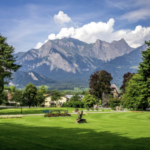If you live in a western country, you may be surprised when you hear I say that traveling the world actually saves money. I got this conclusion after learning from my friends who have travelled the world, and more importantly, according to my own experience, I know it’s true.
-
When you go to another country, live like a local resident rather than a tourist.
In their book Quit Like a Millionaire: No Gimmicks, Luck, Or Trust Fund Required, Bryce Leung and Kristy Shen point out that they literally save money by traveling the world. Here is why: When they go to countries like Thailand, they don’t live like tourists. Instead, they live like local residents. Since the cost of living is much lower in those countries, they actually save a lot of money by traveling overseas.
Besides, when you go to places such as Southeast Asia and Eastern Europe, you will realize that people in western countries are indeed extremely lucky. Since the West has been financially successful for a very long time, there is a potential danger for the western society – according to Al Ries and Jack Trout, success oftentimes leads to arrogance, and arrogance to failure.
Yes, ego is the enemy of success. Objectivity is what’s needed. Sadly, when people become successful, they usually become less objective: they tend to substitute their personal judgment for what the society / the market wants.
Robert Maxwell and Donald Trump are two examples of people blinded by early success. When that happens, it’s difficult to focus.
Truthfully, ego is helpful to some degree because it can be a powerful driving force in building a career or a business. What really hurts is injecting your ego in the marketing / promotion process.
-
When you travel the world, you are less stressed, so you can manage your finances better.
Lara Briden claims that stress has a big impact on an individual’s overall health. First of all, stress affects your hypothalamus directly, which is your brain’s hormone command center. Under stress, a person’s hypothalamus reduces its signals to the pituitary. And the issue of stress doesn’t stop there. Furthermore, stress increases cortisol as well, which is the stress hormone made by the adrenal glands. Basically, cortisol is a fight-or-flight, life-saving hormone which gets people through huge challenges like danger or infection. Cortisol can change your physiology in various ways that improve short-term survival, e.g. raising blood pressure and increasing heart rate. It also makes you more alert while increasing your blood sugar to give your muscles more energy. Short-term activation of cortisol is good.
But chronic, long-term activation of cortisol is not good. When cortisol stays high all the time, it takes protein away from muscles and reduces your sensitivity to insulin. Worse still, it weakens the immune system. And it negatively affects the hippocampus which is the part of the brain that calms the hypothalamic-pituitary-adrenal axis. Consequently, long-term stress may lead to dysfunction or dysregulation of your hypothalamic-pituitary-adrenal axis.
Interestingly, when you change your environment regularly, you can regulate your hypothalamic-pituitary-adrenal axis. That explains why traveling the world is a healthy lifestyle choice. From my experience, whenever I’m traveling, I always sleep like a baby, especially when I finish a trip! Experts argue that joy and rest are the best treatments for your hypothalamic-pituitary-adrenal axis. In the pursuit of good health, you should have the permission to take some time away from work and other commitments or duties so that you can spend some time doing things you enjoy, including traveling the world.
Make time to smell the roses and enjoy life now – this is very important to your health and wellbeing. When you feel better physically, mentally and emotionally, you are able to make more money and manage your personal finances more effectively as well.
The ultimate asset that you have is your own health.
-
Herbal medicines that I’ve discovered while living overseas:
When I was living in Russia, a friend of mine introduced rhodiola rosea to me. Rhodila rosea is a herbal medicine which was traditionally used as a fertility and energy tonic in countries such as Russia, Sweden, Norway and Iceland. It works like a miracle – it calms me down by sheltering my brain from cortisol. It can also relieve symptoms of anxiety and depression.
Ziziphus spinosa is a herbal medicine from traditional Southeast Asian medicine. As a non-addictive sedative that is often combined with magnolia for a stronger effect, ziziphus is very helpful for palpitations.
When I was in Russia, I also discovered other helpful herbal medicines such as hops, passionflower, magnolia, valerian and kava.
Note that using herbal medicines is much cheaper and more effective than using supplements in western countries, so this can certainly save you lots of money.
-
Other benefits of traveling the world:
Apart from saving money, traveling the world also has many other benefits.
First, travel can reduce cortisol and modulate your stress response effectively. It improves your sensitivity to insulin and can treat or prevent many issues.
Second, travel reduces chronic inflammation. I know this sounds a bit strange, but please let me explain.
Travel brings you joy, and joy is the best medicine of all, according to Dr. Christiane Northrup. Joy can trigger release of nitric oxide which is very important to our general health.
The more frequently your body releases nitric oxide, the softer, more flexible and wider your blood vessels become, for you have trained them to relax over time. You deserve joy!
My mother is a doctor too, and her prescription for general health is experiencing more joy every single day. She asked me to make a list of as many joyful experiences and activities as I can before I leave home for another trip overseas. That’s the best prescription I’ve ever received. What a gift!
When it comes to joy and happiness, you may train your body to feel more and more of these positive emotions by being fully present and mindful.
While living in Russia, I met a mentor who taught me the importance of having a good time every day. That is fantastic for bringing perspective to my daily experiences and remembering how challenges set me up to more deeply appreciate blessings. My mentor asked me to do an exercise which indeed helped me to remember how important it is to enjoy life rather than just getting through my To Do list every day. This exercise is called “a Brag, a Grateful and a Desire”.
First and foremost, identify something to brag about (What are you proud of now?)
In my case, I lost weight successfully, so I’m very proud of this achievement.
In the second place, identify something you are grateful for or you truly appreciate (What blessing can you acknowledge now?)
Personally, I’m grateful for my parents who gave me life and wisdom. Without their contribution, I wouldn’t become who I am today.
Lastly, identify something you deeply desire. (If time and money were no object, what do you desire?)
“Traveling the world never fails to uplift me and literally generates nitric oxide, too!”










